|
Books Should Be Free Loyal Books Free Public Domain Audiobooks & eBook Downloads |
|
|
Books Should Be Free Loyal Books Free Public Domain Audiobooks & eBook Downloads |
|
Humorous Books |
|---|
|
Book type:
Sort by:
View by:
|
By: Edna Ferber (1885-1968) | |
|---|---|
 Dawn O'Hara, The Girl Who Laughed
Dawn O'Hara, The Girl Who Laughed
Dawn O’Hara, the Girl Who Laughed was Edna Ferber’s first novel. Dawn, a newspaperwoman working in New York, finds herself back home in Michigan on doctor’s orders. Years of living in boarding-houses and working to pay for the care of her brilliant but mentally ill husband, Peter Orme, have taken their toll. At twenty-eight, Dawn feels like an old woman with no future. But, the loving care of her sister Norah and her family along with the attentions of the handsome German doctor, Ernst Von Gerhard, slowly bring Dawn back to life... | |
 Buttered Side Down
Buttered Side Down
"And so," the story writers used to say, "they lived happily ever after." Um-m-m—maybe. After the glamour had worn off, and the glass slippers were worn out, did the Prince never find Cinderella's manner redolent of the kitchen hearth; and was it never necessary that he remind her to be more careful of her finger-nails and grammar? After Puss in Boots had won wealth and a wife for his young master did not that gentleman often fume with chagrin because the neighbors, perhaps, refused to call on the lady of the former poor miller's son? It is a great risk to take with one's book-children... | |
By: Edward Eggleston (1837-1902) | |
|---|---|
 Hoosier Schoolmaster
Hoosier Schoolmaster
"Want to be a school-master, do you? You? Well, what would you do in Flat Crick deestrick, I'd like to know? Why, the boys have driv off the last two, and licked the one afore them like blazes. You might teach a summer school, when nothin' but children come. But I 'low it takes a right smart man to be school-master in Flat Crick in the winter. They'd pitch you out of doors, sonny, neck and heels, afore Christmas." | |
By: Edward Lear (1812-1888) | |
|---|---|
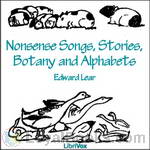 Nonsense Songs, Stories, Botany and Alphabets
Nonsense Songs, Stories, Botany and Alphabets
A selection of nonsense poems, songs (not sung!), stories, and miscellaneous strangeness. The work includes the "Owl and the Pussycat" and a recipe for Amblongus Pie, which begins "Take 4 pounds (say 4½ pounds) of fresh ablongusses and put them in a small pipkin."Edward Lear was an English writer, poet, cat-lover, and illustrator (his watercolours are beautiful). This recording celebrates the 200th anniversary of Lear's birth. | |
By: Edward M. Forster (1879-1970) | |
|---|---|
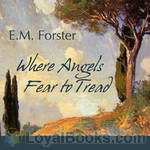 Where Angels Fear to Tread
Where Angels Fear to Tread
On a journey to Tuscany with her young friend and traveling companion Caroline Abbott, widowed Lilia Herriton falls in love with both Italy and a handsome Italian much younger than herself, and decides to stay. Furious, her dead husband’s family send Lilia’s brother-in-law to Italy to prevent a misalliance, but he arrives too late. Lilia marries the Italian and in due course becomes pregnant again. When she dies giving birth to her child, the Herritons consider it both their right and their duty to travel to Monteriano to obtain custody of the infant so that he can be raised as an Englishman. | |
By: Edward Phillips Oppenheim (1866-1946) | |
|---|---|
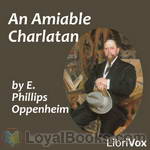 An Amiable Charlatan
An Amiable Charlatan
An Englishman is enjoying his dinner at Stephano's, at which he is a regular diner. A man enters quickly, sits at his table, starts eating his food, and hands him a packet underneath the table! So begins Paul Walmsley's acquaintance - and adventures - with American adventurer Joseph H. Parker and his lovely daughter, Eve. (Intro by TriciaG)Note that there is an alternate reading of section 8. Both are excellent renditions, so enjoy either or both of them. | |
By: Edward S. Van Zile (1863-1931) | |
|---|---|
 Perkins, the Fakeer: A Travesty on Reincarnation
Perkins, the Fakeer: A Travesty on Reincarnation
As the title suggests we are treated to three humourous and curious psychical transpositions in the cases of "When Reginald was Caroline," "How Chopin came to Remsen," and "Clarissa's troublesome baby" . If you're looking for a break from more serious fare you can count on this one to amuse and entertain you. Summary by Celine Major. | |
By: Edward Streeter (1891-1976) | |
|---|---|
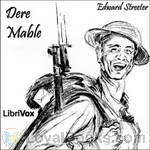 Dere Mable
Dere Mable
Bill is in training camp, preparing to go off to World War I. This book is a collection of love letters written to his sweetheart, Mable. The letters are humorous, mis-spelled, and have many stories of life in an army camp – all from Bill’s unique perspective. | |
By: Edwin Abbott Abbott (1838-1926) | |
|---|---|
 Flatland: A Romance of Many Dimensions
Flatland: A Romance of Many Dimensions
If you've never heard the term “Mathematical Fiction” before, Edwin Abbott Abbott's 1884 novella, Flatland can certainly enlighten you! Flatland: A Romance of Many Dimensions was published in 1884 and since then, it has been discovered and re-discovered by succeeding generations who have been delighted by its unique view of society and people. The plot opens with a description of the fictional Flatland. The narrator calls himself “Square” and asks readers to “Imagine a vast sheet of paper on which straight Lines, Squares, Triangles, Pentagons, Hexagons and other figures, instead of remaining fixed in their places, move freely about... | |
By: Edwin F. Benson (1867-1940) | |
|---|---|
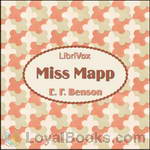 Miss Mapp
Miss Mapp
E. F. Benson’s Mapp and Lucia series, consists of six novels and three short stories. The novels are: Queen Lucia, Lucia in London, Miss Mapp (including the short story The Male Impersonator), Mapp and Lucia, Lucia’s Progress (published as The Worshipful Lucia in the U.S.) and Trouble for Lucia. Most of these works are set in the fictional village of “Tilling”, which is based on the village of Rye, Sussex, England. “Mallards”, the house with the garden room inhabited by Miss Mapp, and later by Lucia, is based on Lamb House, Benson’s own home in Rye. Earlier, the house was the Sussex home of writer Henry James. | |
By: Eleanor H. Porter (1868-1920) | |
|---|---|
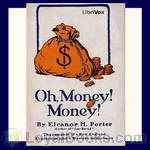 Oh, Money! Money!
Oh, Money! Money!
Mr. Stanley Fulton is worth millions, but he has no one to leave his money to except some unknown distant cousins. In order to find out how they would handle a fortune, he decides to give each of them $100,000 dollars during his life, and go – incognito - to live in their midst! Who will prove worthy to inherit his millions and will his deception be discovered?Eleanor H. Porter was an early 20th century author of children’s literature and novels. Her most well known book was “Pollyanna” and it’s sequel, “Pollyanna Grows Up”. | |
By: Eleanor Hallowell Abbott (1872-1958) | |
|---|---|
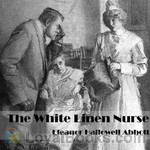 The White Linen Nurse
The White Linen Nurse
Throughout three years of school, Rae Malgregor had been perfectly pliant, perfectly compliant to all the demands placed on her. But now, on the eve of graduation, she couldn’t go on with the mask of artificiality and the air of perfection. She had been chasing this nursing job three whole years, but there was just no wag to it! The Superintendent was stunned. Her best student! The Senior Surgeon was all grey granite business and livid that his time was being taken up with a hysterical nurse! And yet, though he wouldn’t have admitted it to anyone, especially himself, his interest was piqued. | |
 Rainy Week (Dramatic Reading)
Rainy Week (Dramatic Reading)
Join this couple in their annual house party where the “guests” becoming unknowing “actors” in their beach house play “Rainy Week” . “To be indeed absolutely explicit experience has proved, with an almost chemical accuracy, that, quite regardless of "age, sex, or previous condition of servitude," this particular combination of Romantic Passion, Psychic Austerity, Tragedy, Ambition, Poignancy, Innocence, And Irritation, cannot be housed together for even one Rainy Week without producing drama!” Cast Narrator/Mrs... | |
By: Eliza Armstrong | |
|---|---|
 Teacup Club (Dramatic Reading)
Teacup Club (Dramatic Reading)
The Teacup Club is formed when Dorothy decides to found an intellectual club of her own - to teach her fiance a lesson! The club’s discussion topics includes Theosophy, Politics and Women in Legislature. The club’s unofficial topics include Emily’s new dress, man-flu and the great mystery of the missing chafing-dish. A witty drama and a comedy of manners, secrets and politics . - Summary by Elizabby Cast List: Cast Narrator: Beth Thomas Evelyn: Jennifer Fournier Emily: Leanne Yau Dorothy: KHand Frances: Beth Thomas Elise: Lydia Marion: Vicki Hibbins Catharine: Michele Eaton Edited by: Michele Eaton and linny Proof listeners: Michele Eaton, Beth Thomas | |
By: Elizabeth Gaskell (1810-1865) | |
|---|---|
 Cranford (version 2)
Cranford (version 2)
Cranford is set in a small market town populated largely by a number of respectable ladies. It tells of their secrets and foibles, their gossip and their romances as they face the challenges of dealing with new inhabitants to their society and innovations to their settled existence. It was first published between 1851 and 1853 as episodes in Charles Dickens’ Journal Household Words. Appended to this recording is a short sequel, The Cage at Cranford, written ten years later and published in the journal All the Year Round... | |
By: Ella Wheeler Wilcox (1850-1919) | |
|---|---|
 Six Bad Husbands and Six Unhappy Wives
Six Bad Husbands and Six Unhappy Wives
This is a collection of six short stories, each of them illustrating that even a marriage which looks perfect from the outside can be sabotaged quite easily by the two people involved. | |
By: Ellis Parker Butler (1869-1937) | |
|---|---|
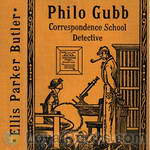 Philo Gubb, Correspondence-School Detective
Philo Gubb, Correspondence-School Detective
Philo Gubb, not being content with his job as wallpaper-hanger, has higher aspirations: to become a detective, just like Sherlock Holmes. To that end, he enrolls in a correspondence course, where he gets lessons through the mail as well as the necessary disguises for a detective. Philo Gubb, not being really clever or intuitive, or even looking good in those disguises, gets involved in one case after the other - and sooner or later happens to stumble on and solve the crime... Each of these stories... | |
 Cheerful Smugglers
Cheerful Smugglers
Saving for the baby's education: how can a young family be disciplined so as to regularly put money in the pig (bank)? Why, put a tariff on all items coming into the house, just like the U.S. Government does/did for items coming into the country! But the devil is in the details; what about taxing items brought in by visitors? Is the housemaid herself a taxable item? What items really are 'necessaries' versus luxuries? When visitors arrive these guests stoop to either 'smuggling' in their luggage items to avoid having to pay up to 30% of the value, or wear only what they came dressed in... | |
 That Pup
That Pup
A puppy, unanounced and unordered, arrives in a crate at Mr. Murchison's house. Humorous events follow. | |
 Adventures of a Suburbanite
Adventures of a Suburbanite
Why is the neighbor so obsessed with his car? Where can we find a good gardener? Should we have a Santa Claus at our Christmas party? Yes, this is suburbia... much the same today as it was in 1911. | |
 Ellis Parker Butler Short Story Collection, Vol 1
Ellis Parker Butler Short Story Collection, Vol 1
Ellis Parker Butler was an American author. He was the author of more than 30 books and more than 2,000 stories and essays. These are eight of his humorous short stories about life. | |
 Perkins of Portland
Perkins of Portland
Amusing tales showing the effectiveness of advertising some rather questionable products. Perkins and the narrator partner in promotions directed at a gullible and willing public. Unlike most tales of the kind, with moralistic endings where the 'sharps' come to grief, Perkins and Co. become wealthy and quite pleased with themselves. | |
 Swatty: A Story of Real Boys
Swatty: A Story of Real Boys
The fun adventures of Georgie, Swatty, and Bony, as they encounter flooding rivers, emotional girls, burning buildings, rotten stumps, mean teachers, a haunted house, dark caves, murderers, and ice jams. | |
 In Pawn
In Pawn
Inspired by "Lives of the Saints", fat, lazy, good-for-nothing Harvey Redding decides to give up the junk-collecting business, and become a Saint. Meanwhile, deeply in debt to his sister, he has left his son Lem with her until he is able to pay her back. | |
By: Emily Eden (1797-1869) | |
|---|---|
 Semi-Attached Couple
Semi-Attached Couple
Young and beautiful Helen Eskdale and fabulously wealthy Lord Teviot seem to be the perfect match. But when they marry, they find that misunderstandings and jealousies continually drive them apart. The machinations and intrigues of a large supporting cast surround the central question of whether their marriage will survive. Emily Eden's comedy of manners is reminiscient of Jane Austen's witty and ironic novels. | |
By: Eugene Field (1850-1895) | |
|---|---|
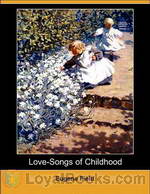 Love-Songs of Childhood
Love-Songs of Childhood
If you've heard and loved that delightful nursery rhyme/lullaby, Wynken Blynken and Nod you'd certainly enjoy browsing through its creator Eugene Field's Love Songs of Childhood. The volume contains some forty or more poems for children, which are ideal for read aloud sessions with young folks. Parents will certainly enjoy reading them too. Most of these poems have been set to music and are ideal for family sing-alongs too. Eugene Field was a gifted humorist as well as being a talented children's writer... | |
By: F. Anstey (1856-1934) | |
|---|---|
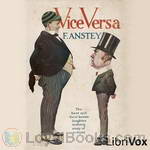 Vice Versa
Vice Versa
Set in Victorian times, the novel concerns business man Paul Bultitude and his son Dick. Dick is about to leave home for a boarding school which is ruled by the cane wielding headmaster Dr. Grimstone. Bultitude, seeing his son's fear of going to the school, foolishly says that schooldays are the best years of a boy's life, and how he wished that he was the one so doing. At this point, thanks to a handy magic stone brought by an uncle from India which grants the possessor one wish, they are now on even terms... | |
 Baboo Jabberjee, B.A.
Baboo Jabberjee, B.A.
Another delightful example of an English writer poking fun at his countrymen, or maybe all races' reactions to someone from a diferent background. A series of adventures of a well educated foreigner in London which originally appeared weekly in Punch, sometimes with illustrations, dealing with the difficulties of fully understanding a different culture. The hero's perfect English reminds one of a quote from "My Fair Lady" ..."His English is too good, he said, "that clearly indicates that he is Foreign. Whereas other people are instructed in their native language English people aren't." | |
 Talking Horse And Other Stories
Talking Horse And Other Stories
A collection of short stories by famed humorist and Punch magazine staff member, F. Anstey, pseudonym for Thomas Anstey Guthrie. They range from humorous and whimsical to haunting and thought-provoking. | |
 Tinted Venus
Tinted Venus
When a young newly engaged man finds himself bound for an amusement garden with an old flame, not his fiancee, it is not surprising that he still feels some attraction for her. When they escape the heat of the dance floor to walk among the trees in the garden, it is not surprising that they should come upon a statue of a woman of uncommon beauty, with the smallest hands. When the young man attempts to demonstrate that his absent fiancee has hands even smaller than this immortalized stone woman, it is surprising when the engagement ring he is carrying fits easily on the stone finger, but does not easily come off... | |
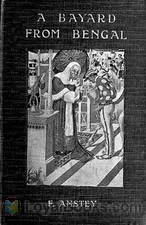 Bayard from Bengal
Bayard from Bengal
The estimable gentleman, Chunder Bindabun Bhosh, ESQ., B.A., travels from his native India to England, with his impeccable English and manners, which immediately mark him as a foreigner, and embarks on an enviable program of escapades. These stories are the product of the fertile imagination of Hurry Bungsho Jabberjee, B.A., a nom de plume for the humorist F. Anstey, which is a further nom de plume for Thomas Anstey Guthrie. Whether rescuing a nubile maiden from a charging bull or falling in love with said nubile maiden, Mr. Bosh, B. A. cannot help but perform with the requisite humor to engage our attention. | |
 In Brief Authority
In Brief Authority
Satiric comedy from 1915 about a nouveau riche British family and their nanny who get whisked off to Maerchenland ('the land of Fairy Tales') one evening in a car drawn by storks. The matron of the family, a thorough snob, is crowned Queen of the country by mistake. She is quick to accept her new position and is determined to introduce British social niceties in her realm. And this really is the land of Fairy Tales, with gnomes, giants, a dragon, magic, a fairy godmother and more. Trouble quickly starts to brew as the royal couple and their son introduce things like capitalism and golf... | |
 Voces Populi
Voces Populi
F. Anstey was the nom de plume of Thomas Anstey Guthrie, a Londoner who was trained for the bar but found success as a writer of humorous pieces for Punch and humorous novels. Voces Populi, a collection of his Punch pieces, is considered to be among his best works. He treats an array of situations from the charlatan conjuror to a row over a lady's large, obstructive hat at the music hall. | |
 Mr. Punch's Model Music-hall Songs & Dramas
Mr. Punch's Model Music-hall Songs & Dramas
F. Anstey was the nom de plume of Thomas Anstey Guthrie, a Londoner who was trained for the bar but found success as a writer of humorous pieces for Punch and humorous novels. Mr. Punch's Model Music Hall is a collection of humorous pieces written for Punch, divided into songs and dramas. In his usual fashion, Mr. Anstey captured the tone of his times and then exaggerated whatever was already absurd to entertain and give pointed commentary at the same time. | |
By: F. Scott Fitzgerald | |
|---|---|
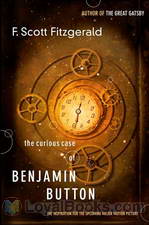 The Curious Case of Benjamin Button
The Curious Case of Benjamin Button
A life lived backwards, with events happening in reverse order forms the strange and unexpected framework of one of F Scott Fitzgerald's rare short stories. The Curious Case of Benjamin Button was published in Collier's in 1927 and the idea came to Fitzgerald apparently from a quote of Mark Twain's in which he regretted that the best part of life came at the beginning and the worst at the end. Fitzgerald's concept of using this notion and turning the normal sequence of life on its head resulted in this delightful, thought provoking fantasy tale... | |
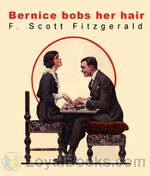 Bernice Bobs Her Hair
Bernice Bobs Her Hair
Pretty but socially clueless Bernice lets her know-it-all cousin push her around, but eventually, something's gotta give! (Introduction by BellonaTimes) | |
By: Forrest Crissey (1864-1943) | |
|---|---|
 Tattlings of a Retired Politician
Tattlings of a Retired Politician
"The letters of Hon. William Bradley, Ex-Governor and former veteran of practical politics, written to his friend and protege Ned who is still busy 'carving a career back in the old state.'" This is a novel filled with humorous political anecdotes by the main character, the Honorable William Bradley, told for the benefit of his protege, Ned. It conveys a sense of the ironic and humorous side of politics in Washington and back in their home state. | |
By: François Rabelais (1494-1553) | |
|---|---|
 Gargantua and Pantagruel, Book III
Gargantua and Pantagruel, Book III
The five-volume work chronicling the adventures of father Gargantua and son Pantagruel is a vehicle for Rabelais' satire of sixteenth-century European society. It is lively, outrageous, and, at times, bawdy. This the third of the five volumes--all are translated by Thomas Urquhart and Peter Motteux | |
By: Frank Gelett Burgess (1886-1951) | |
|---|---|
 Maxims of Methuselah
Maxims of Methuselah
Being the Advice given by the Patriarch in his Nine Hundred Sixty and Ninth Year to his Great Grandson at Shem's Coming of Age, in Regard to Women.The following is, so far as I know, the only authentic rendering into the English language of the three hundred and thirty parables attributed to Methuselah. . . . Of its origin, the book, although freely rendered into the idiom of the hour, still bears intrinsic evidence of having been compiled by one who had had extraordinary experience with women. The amorous expert will not find it hard to believe that 969 years would be none too short a time for any one man to have accumulated such a profound lore... | |
 Romance Of The Commonplace
Romance Of The Commonplace
Thirty four whimsical, tongue-in-cheek, and entertaining essays about not much in particular, published in 1902, by one of the most popular writers of the late nineteenth and early twentieth centuries. The American Gelett Burgess was an artist, art critic, poet, author, and humorist. Nonsense verse was a specialty. - Summary by David Wales | |
By: Frank Thomas Bullen (1857-1915) | |
|---|---|
 Confessions of a Tradesman
Confessions of a Tradesman
Frank T. Bullen is best known for his books based on his adventures at sea. However, he had a life on shore as well. He first went to sea as a boy as a cabin boy. He there had many adventures as a hand on a whaling ship. He then came ashore and tried his hand at being a "Tradesman". This is that story and also tells how he became the well-known author he is now. It is a very interesting, enjoyable and entertaining depiction of the trials and tribulations he had in his life in 19th century London as a tradesman. - Summary by Wayne Cooke | |
By: Frederic Stewart Isham (1866-1922) | |
|---|---|
 Nothing But the Truth
Nothing But the Truth
A young man, finding himself unexpectedly impecunious, attempts to improve his fortunes by wagering that he can speak nothing but the absolute truth for three weeks. He soon learns, however, that telling only the unvarnished truth can have surprising consequences. This 1914 novel of love, mystery, and misunderstandings, with amusing characters and plot twists, was adapted as a Broadway play in 1916, followed by six motion pictures: in 1920 and 1929; in 1931 separately in Spanish, French and German; and in 1941 starring Bob Hope and Paulette Goddard. Frederic S. Isham was a writer of short stories, novels and plays. (Lee Smalley) | |
By: Frederick Marryat (1792-1848) | |
|---|---|
 Snarleyyow
Snarleyyow
This is a quite amusing nautical tale of the British Navy of the around the year 1700. While, as with much early 'humor', it is somewhat heavy-handed, the sympathies of the author are clear and good, and cruelty is often averted by good fortune or background characters. First published under the title 'The Dog Fiend', the primary characters are an evil captain of a cutter and his dog. The dog seems indestructible, as is the poor cabin boy who is the butt of the captain's ill humor, and who often is chewed on by the dog... | |
By: Fyodor Dostoyevsky (1821-1881) | |
|---|---|
 Crocodile
Crocodile
Ivan Matveich, the most ordinary person you might hope to meet, is swallowed alive by a crocodile at a sideshow. Finding life inside the belly of the beast quite comfortable, he makes a home for himself there. His disquisitions on the state of the world from inside the crocodile make him quite a name for himself; while all the while the discussion rages outside as to whether the beast is going to be cut open to release him or not, its value as a sideshow attraction having massively increased owing to the presence of the human voice buried inside it. One of Jorge Luis Borges' seven most favourite stories. - Summary by Tony Addison | |
By: G. K. Chesterton | |
|---|---|
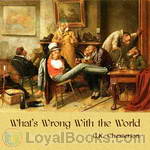 What's Wrong With the World
What's Wrong With the World
Gilbert Keith Chesterton (1874–1936) has been called the “prince of paradox.” Time magazine observed of his writing style: “Whenever possible Chesterton made his points with popular sayings, proverbs, allegories—first carefully turning them inside out.” His prolific and diverse output included journalism, philosophy, poetry, biography, Christian apologetics, fantasy and detective fiction. The title of Chesteron’s 1910 collection of essays was inspired by a title given to him two years earlier by The Times newspaper, which had asked a number of authors to write on the topic: “What’s wrong with the world?”... | |
 The Defendant
The Defendant
A collection of reprinted articles on a wide-range of subject, all in the unique style of G. K. Chesterton. Using wit, paradox, and good humor he “defends” a series of seeming harmless things that need no defense, and in so doing he exposes many of the broken assumptions and dogmatic notions of secular humanism and other trends of his age and of ours. | |
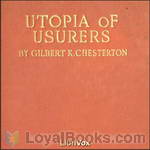 A Utopia of Usurers
A Utopia of Usurers
“Now I have said again and again (and I shall continue to say again and again on all the most inappropriate occasions) that we must hit Capitalism, and hit it hard, for the plain and definite reason that it is growing stronger. Most of the excuses which serve the capitalists as masks are, of course, the excuses of hypocrites. They lie when they claim philanthropy; they no more feel any particular love of men than Albu felt an affection for Chinamen. They lie when they say they have reached their position through their own organising ability... | |
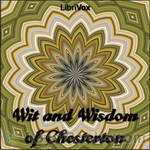 Wit and Wisdom of Chesterton
Wit and Wisdom of Chesterton
In this collection, Bevis Hillier has put together some of Chesterton's essays in "The Defandant", "Varied Types" and "Tremendous Trifles". These 12 pieces were chosen to giving a peek into the margins of Chesterton's work and give a sense of the distinctive flavor of his mind. They were also chosen with an eye to showing what a complex and fascinating character he was. | |
 Tales of the Long Bow
Tales of the Long Bow
These tales concern the doing of things recognized as impossible to do; impossible to believe; and, as the weary reader may well cry aloud, impossible to read about. Did the narrator merely say that they happened, without saying how they happened, they could easily be classified with the cow who jumped over the moon or the more introspective individual who jumped down his own throat. In short, they are all tall stories; and though tall stories may also be true stories, there is something in the very phrase appropriate to such a topsy-turvydom; for the logician will presumably class a tall story with a corpulent epigram or a long-legged essay. | |
By: Geoffrey Chaucer | |
|---|---|
 Chaucer Storybook
Chaucer Storybook
Geoffrey Chaucer's classic "Canterbury Tales" has here been rendered into clear and contemporary English prose. These classic stories are now available to those who would like to read them without struggling through Middle English poetry. The character and humour of The Wife of Bath and other larger-than-life people created by Chaucer are now accessible to a wider audience, including children. Please note that the original Canterbury Tales includes 24 stories, of which 11 are reproduced here. - Summary by Beth Thomas | |
By: George Ade (1866-1944) | |
|---|---|
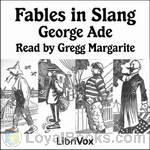 Fables in Slang
Fables in Slang
While a columnist for The Chicago Record humorist George Ade penned numerous “fables” which were subsequently collected into books. Fables in Slang is the first of these collections. It contains 26 satirical stories that lampoon phrenologists, idealists, snobs, fanatics and other ignorant fools of the day, most of which still wander through our modern lives. Jean Shepherd considered Ade a predecessor who made writers like James Thurber, Mike Royko, and himself possible. Fables in Slang was first published in 1899 by Herbert S. Stone and Company. | |
By: George Barr McCutcheon (1866-1928) | |
|---|---|
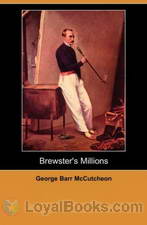 Brewster's Millions
Brewster's Millions
He hosts an all expenses paid luxury cruise to Europe for fifty guests and showers them with expensive gifts. When he's mugged in a dark alley, he insists that the thugs also take the $300 stashed away in his back pocket. He flies into a rage whenever one of his employees suggests cutting costs. Every time he places a bet, he wins, causing him even more despair! In Brewster's Millions by George Barr McCutcheon, a classic riches-to-rags tale, Montgomery Brewster is bound by the terms of an eccentric uncle's will to spend one million dollars completely within a year so that he can lay claim to an even bigger fortune... | |
 Yollop
Yollop
Mr. Crittenden Yollop makes friends with the man who came to burglarize his home and sets out to help him return to where he really wants to be...prison. This humorous satire takes a somewhat different look at prisons, criminals, the law and reformers. | |
By: George Farquhar (1677-1707) | |
|---|---|
 Sir Harry Wildair
Sir Harry Wildair
This sequel to the Jubilee [The Constant Couple, or A Trip to the Jubilee] appeared at Drury Lane in 1701, and was almost as popular as its predecessor. The smartness of the dialogue, the witty comment upon the fashions of the hour, the movement of the story, the vice and flippancy exhibited by its chief character, all specially appealed to the audience before whom it was produced, and the comedy had a run of several nights. - Cast list: Sir Harry Wildair: Peter Tucker Banter, Beau, a younger... | |
By: George Fullerton Evans (-1963) | |
|---|---|
 College Freshman's Don't Book
College Freshman's Don't Book
A short, humorous guide of what not to do in your first year of college. | |
By: George Gibbs (1870-1942) | |
|---|---|
 Madcap
Madcap
Quote: "To the quiet Titine her mistress created an impression of bringing not only herself into the room, but also the violent horse and the whole of the out-of-doors besides." --Chapter 1 of Madcap. --In the same chapter, Hermia Challoner, this force of nature pitted against the nature of her social milieu, laughingly tells her maid, "Better die living--than be living dead." --And thus starts the beginning of an early 20th century quest for something beyond the bored and politely veiled cynicism of class and wealth; beyond oneself. --Add to that a little mischief, a bit of Puckish misdirection. And a bit of romance. | |
 Maker of Opportunities
Maker of Opportunities
When you're tired only because you're bored; and you're bored only because it seems like there's really nothing worth doing; and you're so, so wealthy that one would think opportunity should be knocking at your door every day... you sometimes just have to tell your closer friends how fatiguing the life of he who has everything really is.... And then; you find your calling! | |
By: George Horace Lorimer (1869-1937) | |
|---|---|
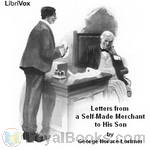 Letters from a Self-Made Merchant to His Son
Letters from a Self-Made Merchant to His Son
Being the Letters written by John Graham, Head of the House of Graham & Company, Pork-Packers in Chicago, familiarly known on 'Change as "Old Gorgon Graham," to his Son, Pierrepont, facetiously known to his intimates as "Piggy." George Horace Lorimer was an American journalist and author. He is best known as the editor of The Saturday Evening Post. | |
By: George Livermore | |
|---|---|
 Take it From Dad
Take it From Dad
Take It From Dad is a collection of letters written by a father to his son, Ted, at boarding school, away from home for the first time. In each letter "Dad" comments on some aspect of Ted's experience, attitude, or behavior, illustrating and driving home his point with an entertaining tale about human nature. This book is appropriate for all ages from adolescence on, and its lessons are as relevant today as when they were written. --Lee Smalley | |
By: George Pope Morris (1802-1864) | |
|---|---|
 Will Nobody Marry Me?
Will Nobody Marry Me?
In addition to his publishing and editorial work, Morris was popular as a poet and songwriter; especially well-known was his poem-turned-song "Woodman, Spare that Tree!" His songs in particular were popular enough that Graham's Magazine in Philadelphia promised Morris $50, sight unseen, for any work he wanted to publish in the periodical. | |
By: George Wilbur Peck (1840-1916) | |
|---|---|
 Sunbeams
Sunbeams
George W. Peck was at times a writer, newspaper publisher and politician. Many of the Sunbeam essays had been published in Peck's paper, "The Sun", as amusing and often critical comments on social and political subjects, typically current in the beginning of the 1900's. Topics are often 'small town' United States, and Peck's gentle sarcasm or portrayals much resembles that of Twain. Listeners must be aware that the Spanish American War was a recent event, leading to the "Yankee" involvement in the Philippines... | |
By: Georgette Heyer | |
|---|---|
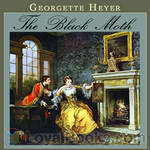 The Black Moth
The Black Moth
Jack Carstares, oldest son of the Earl Wyncham, has been disgraced by his brother. Gone for six years, living the life a highwayman he meets the woman he will fall in love with. Saving her from being kidnapped by a dastardly blackguard he is injured and must stay with her family until he is able to return to his life…will she discovery his true identity? Will he be able to leave her when the time comes? Mystery and humor follow this intriguing cast of characters until the very end. (Summary by Terra Mendoza) | |
By: Gideon Wurdz (b. 1875) | |
|---|---|
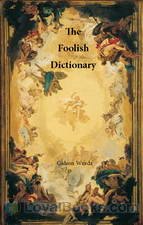 The Foolish Dictionary
The Foolish Dictionary
“The Foolish Dictionary” was written by “Gideon Wurdz” and was published in 1904. According to the beginning of the book, it is “An exhausting work of reference to un-certain English words, their origin, meaning, legitimate and illegitimate use…” This a a short but amusing dictionary which “redefines” words in some interesting ways. Funny and sometimes bizarre observations are sprinkled throughout. In keeping with the policy to read, rather than attempt to rewrite, books – even those with offensive content – nothing has been omitted... | |
By: Guy Wetmore Carryl (1873-1904) | |
|---|---|
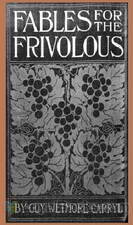 Fables for the Frivolous
Fables for the Frivolous
The Urban Rat and the Suburban Rat, The Persevering Tortoise and the Pretentious Hare, The Ambitious Fox and the Unapproachable Grapes.... If some of these titles seem vaguely familiar to you, you wouldn't be mistaken! Fables for the Frivolous by Guy Wetmore Carryl contains some well-known fables in a modern packaging, with a delightful new twist! The complete title of the original published in 1898 was Fables for the Frivolous (With apologies to La Fontaine) and it was the first published work of this gifted American journalist, humorist and poet... | |
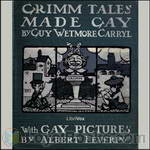 Grimm Tales Made Gay
Grimm Tales Made Gay
A comic rendering in verse of well-loved Fairy Tales of the Brothers Grimm, each ending with a moral and full of puns. The titles of the tales themselves make another verse. | |
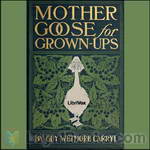 Mother Goose for Grownups
Mother Goose for Grownups
Mother Goose for Grownups is a delightfully silly collection of parodies on well-known Mother Goose tales by Guy Wetmore Carryl. | |
By: H. G. Wells | |
|---|---|
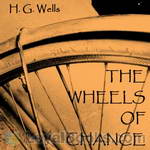 The Wheels of Chance
The Wheels of Chance
“The Wheels of Chance – A Bicycling Idyll” follows the adventures of a Drapers Assistant who, having brought an ancient bicycle, sets off on a 2 week tour of the countryside. He encounters a Lady in Grey wearing rationals (bloomers). And his world will never be the same again | |
 Love and Mr Lewisham
Love and Mr Lewisham
The teaching profession, science and politics in late 19th century England. H.G.Wells’ humorous early novel, drawing on his own life, shows how these – as well as involvement in spiritualism – have to compete with love. | |
 Sea Lady
Sea Lady
| |
 Food of the Gods, and How It Came to Earth (version 2)
Food of the Gods, and How It Came to Earth (version 2)
Mr. Bensington and Professor Redwood have invented a substance that causes living things to grow - and grow - and grow! As their experiments progress, the substance quickly gets out of control and the fun begins as insects and plants receive the benefit of the Food of the Gods. Surely nobody would dream of feeding such a thing to a human child… would they? In this little-known science fiction satire, Wells takes potshots at every member of society: scientists, ministers, charitable heiresses, revolutionaries, and everyone in between. Yet in the end, Wells shows his faith both in humanity and its never-ceasing progress. - Summary by Catharine Eastman | |
 Bealby; A Holiday
Bealby; A Holiday
Bealby is the comical story of the escapade of a thirteen-year-old boy when he rebels against his placement as a steward's-room boy in the great house of an estate named Shonts and flees—not, however, before thoroughly upsetting a weekend party where the nouveau riche couple renting Shonts is entertaining the Lord Chancellor. - Summary by Wikipedia | |
By: Harold Ashton (1875-1919) | |
|---|---|
 Tale of a Tank, and Other Yarns
Tale of a Tank, and Other Yarns
Harold Ashton was the War Correspondent of The Daily News during the First World War and reported extensively on the British army’s involvement in the conflict. Whether working alongside the British troops that were fighting on the frontline or in the trenches or accompanying the massive logistics operation behind the lines – be it the transporting of munitions and supplies or seeing at first hand the work of the Royal Army Medical Corps – he reported on the successes and failures, the tragedies and victories over the course of the war... | |
By: Harry Leon Wilson (1867-1939) | |
|---|---|
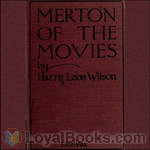 Merton of the Movies
Merton of the Movies
Merton of the Movies is a comedy that centers around Merton Gill, an aspiring dramatic artist from Simsbury, Illinois who makes his way to Hollywood to become a serious actor. How could Merton fail in attaining his dreams after finishing a correspondence course from the General Film Production Company of Stebbinsville, Arkansas, certifying him to be a competent screen actor? Harry Leon Wilson, the author, was a very popular humor writer in the first decades of the 20th century. This book was made into film several times, the last in 1947 starring Red Skelton. | |
By: Helen Rowland (1875-1950) | |
|---|---|
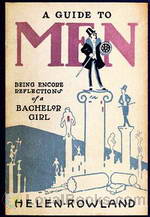 A Guide to Men: Being Encore Reflections of a Bachelor Girl
A Guide to Men: Being Encore Reflections of a Bachelor Girl
A series of occasionally witty one-liners, poems and considerations on the subject of Men, Women and their Conjunction. By turns tender, bland, sexist (in both directions!) and funny. | |
By: Henrik Ibsen (1828-1906) | |
|---|---|
 Hedda Gabler
Hedda Gabler
Hedda Gabler is a play first published in 1890 by Norwegian playwright Henrik Ibsen. In it, Hedda Gabler, daughter of an aristocratic General, has just returned from her honeymoon with George Tesman, an aspiring young academic, reliable but not brilliant, who has combined research with their honeymoon. The reappearance of Tesman’s academic rival, Eilert Lovborg, throws their lives into disarray. | |
By: Henry james (1843-1916) | |
|---|---|
 Third Person
Third Person
The Third Person is an amusing spoof on spooking. The 'ghostly man about the house' in whom two increasingly competitive maiden ladies come to take a proprietary interest is as unlikely to inspire terror as the wraith in one of James's earliest tales. The anticlimactic crisis may need a footnote for younger readers: a Tauchnitz was an unauthorized continental paperback edition of a british or american book which, purely for copyright reasons, was not supposed to be brought back to England. To think of this as smuggling certainly placed, for James's contemporaries, the crimes of the ghostly third person in a hilarious perspective. | |
By: Henry Austin Dobson (1840-1921) | |
|---|---|
 "You Bid Me Try"
"You Bid Me Try"
Henry Austin Dobson, commonly Austin Dobson, was an English poet and essayist. His official career was uneventful, but as a poet and biographer he was distinguished. Those who study his work are struck by its maturity.It was about 1864 that he turned his attention to writing original prose and verse, and some of his earliest work was his best. It was not until 1868 that the appearance of St Paul’s, a magazine edited by Anthony Trollope, gave Harry Dobson an opportunity and an audience; and during the next six years he contributed some of his favourite poems, including “Tu Quoque,” “A Gentleman of the Old School,” “A Dialogue from Plato,” and “Une Marquise... | |
By: Henry Edward Warner (1876-) | |
|---|---|
 That House I Bought; A Little Leaf From Life
That House I Bought; A Little Leaf From Life
This is a whimsical, entertaining, tongue in cheek narrative of the author’s purchase of a house, circa 1911. | |
By: Henry Fielding (1707-1754) | |
|---|---|
 The History of Tom Jones, A Foundling
The History of Tom Jones, A Foundling
Tom Jones is considered one of the first prose works describable as a novel. The novel is divided into 18 smaller books. Tom Jones is a foundling discovered on the property of a very kind, wealthy landowner, Squire Allworthy. Tom grows into a vigorous and lusty, yet honest and kind-hearted, youth. He develops affection for his neighbor’s daughter, Sophia Western. On one hand, their love reflects the romantic comedy genre popular in 18th-century Britain. However, Tom’s status as a bastard causes Sophia’s father and Allworthy to oppose their love; this criticism of class friction in society acted as a biting social commentary... | |
 An Apology for the Life of Mrs. Shamela Andrews
An Apology for the Life of Mrs. Shamela Andrews
An Apology for the Life of Mrs. Shamela Andrews, or simply Shamela, as it is more commonly known, is a satirical novel written by Henry Fielding and first published in April 1741 under the name of Mr. Conny Keyber. Fielding never owned to writing the work, but it is widely considered to be his. It is a direct attack on the then-popular novel Pamela (November 1740) by Fielding's contemporary and rival Samuel Richardson and is composed, like Pamela, in epistolary form. Shamela is written as a shocking revelation of the true events which took place in the life of Pamela Andrews, the main heroine of Pamela... | |
By: Henry James (1843-1916) | |
|---|---|
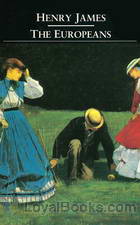 The Europeans
The Europeans
The Europeans: A sketch is a short novel by Henry James, published in 1878. It is essentially a comedy contrasting the behaviour and attitudes of two visitors from Europe with those of their relatives living in the ‘new’ world of New England. The novel first appeared as a serial in The Atlantic Monthly for July-October, 1878. James made numerous minor revisions for the first book publication. | |
By: Henry Murger (1832-1861) | |
|---|---|
 Bohemians of the Latin Quarter
Bohemians of the Latin Quarter
As much as any other work of literature, Henri Murger’s 1851 collection of witty sketches Scènes de la vie de bohème shaped the later romanticized image of the bohemian artist: independent, insouciant, exuberantly lustful, devoted to Art for Art’s sake no matter how cold and hungry the artist might be. Four young Parisian artists, Schaunard the composer, Marcel the painter, Rodolphe the poet, and Colline the philosopher, form an informal Bohemian alliance dedicated to Art and the joy of Life... | |
By: Henry W. Lucy (1845-1924) | |
|---|---|
 Faces and Places
Faces and Places
Faces and Places is a collection of articles on nineteenth century travel, events and personalities by the British journalist Henry Lucy, who wrote for the Daily News, a London newspaper. His open letter To Those About to Become Journalists rings as true today as when it was written.The first article, “Fred” Burnaby, includes a lively account of a balloon trip, while Night and Day on the Cars in Canada and Easter on Les Avants relate Lucy’s experiences of rail travel at that time. Other travel tales (A Night on a Mountain, Mosquitoes and Monaco, and Oysters and Arcachon) provide an insight into the Victorian Englishman’s attitude to Europe... | |
By: Henry Wallace Phillips (1869-1930) | |
|---|---|
 Trolley Folly
Trolley Folly
This collection of eleven short stories is packed with Henry Wallace Phillips' offbeat humor. You will find a trolley car driver, bored with his route, who decides to drive around town instead. There are a couple of men unfamiliar with the basic properties of a canoe. And watch out for the curse of the chewing gum. Fun to read. Fun to record | |
By: Herbert George Jenkins (1876-1923) | |
|---|---|
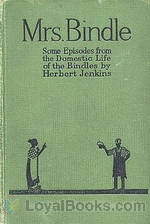 Mrs. Bindle
Mrs. Bindle
Herbert Jenkins' most popular fictional creation was Mr. Joseph Bindle, who first appeared in a humorous novel in 1916 and in a number of sequels. In the preface to the books, T. P. O'Connor said that "Bindle is the greatest Cockney that has come into being through the medium of literature since Dickens wrote Pickwick Papers". The stories are based on the comedic drama of life at work, at home and all the adventures that take place along the way. It becomes clear as the stories progress that Bindle would not be who he is without Mrs. Bindle, and this book seeks to tell the stories of the Bindles from the distaff point of view. | |
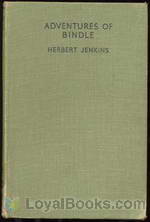 Adventures of Bindle
Adventures of Bindle
Jenkins' most popular fictional creation was Mr. Joseph Bindle, who first appeared in a humorous novel in 1916 and in a number of sequels. In the preface to the books, T. P. O'Connor said that "Bindle is the greatest Cockney that has come into being through the medium of literature since Dickens wrote Pickwick Papers". The stories are based on the comedic drama of life at work, at home and all the adventures that take place along the way. | |
By: Herman Melville (1819-1891) | |
|---|---|
 The Encantadas, Or Enchanted Isles
The Encantadas, Or Enchanted Isles
The Encantadas or Enchanted Isles is a novella by American author Herman Melville. First published in Putnam's Magazine in 1854, it consists of ten philosophical "Sketches" on the Encantadas, or Galápagos Islands. It was collected in The Piazza Tales in 1856. The Encantadas was to become the most critically successful of that collection. All of the stories are replete with symbolism reinforcing the cruelty of life on the Encantadas. (Introduction excerpted from Wikipedia) | |
By: Heywood Broun (1888-1939) | |
|---|---|
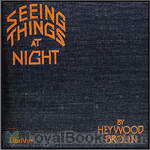 Seeing Things at Night
Seeing Things at Night
This Book is a collection of humorous short stories which describe the comedy in everyday things and situations. | |
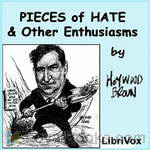 Pieces of Hate and other Enthusiasms
Pieces of Hate and other Enthusiasms
This book is a collection of humorous short stories about ordinary instances in daily life. We learn many interesting things about life, such as how to court women successfully, what it feels like to be a god, and why sometimes it would be a good idea to exchange one's own newborn baby for a better one at the hospital. | |
By: Hugh McHugh (1867-1926) | |
|---|---|
 Down The Line with John Henry
Down The Line with John Henry
A humorous comedy of errors and light-hearted wit in the life of the likeable John Henry. When it comes to betting at the races, booze, his friends, and his woman Clara Jane, it's never a dull moment. The Hot-Air Association is in full session! Will Clara continue to go "down the line" with John Henry? | |
By: Hugh Walpole (1884-1941) | |
|---|---|
 Jeremy And Hamlet: A Chronicle Of Certain Incidents In The Lives Of A Boy, A Dog, And A Country Town
Jeremy And Hamlet: A Chronicle Of Certain Incidents In The Lives Of A Boy, A Dog, And A Country Town
Hamlet is Jeremy’s dog. This 1923 book is Hugh Walpole’s second volume in his Jeremy semi-autobiographical trilogy , Jeremy at Crale ), about a ten-year-old English boy. One commentator wrote this of the first book: “With affectionate humor, Mr. Walpole tells the story of Jeremy and his two sisters, Helen and Mary Cole, who grow up in Polchester, a quiet English Cathedral town…. Mr. Walpole has given his narrative a rare double appeal, for it not only recreates for the adult the illusion of his own happiest youth, but it unfolds for the child-reader a genuine and moving experience with real people and pleasant things... | |
By: Imogen Clark | |
|---|---|
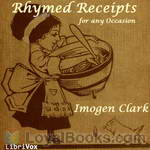 Rhymed Receipts for Any Occasion
Rhymed Receipts for Any Occasion
In addition to being amusing, recipes written in a poetic form were easy to remember and used as learning tools for the young housekeeper. Many of the poems in this 1912 publication were originally published in Woman's Home Companion, Good Housekeeping Magazine, the Housewife, Table Talk, and the Boston Cooking School Magazine. | |
By: Ingersoll Lockwood (1841-1918) | |
|---|---|
 Baron Trump's Marvellous Underground Journey
Baron Trump's Marvellous Underground Journey
The Little Baron Trump is a man of adventure. He and his dog Bulger have already braved many adventures together, but at the time our story opens, they are kind of dull at home, upset with the increasing familiarity of both two- and four legged neighbours. What to do? Luckily, an old manuscript of the learned Spaniard, Don Constantino Bartolomeo Strepholofidgeguaneriusfum, falls into his hands, and off he goes to a journey to the centre of the earth. This is a remarkable book from 1893, blending the tradition of the Münchhausen stories with more modern fantasy and science fiction. - Summary by Carolin | |
By: Irvin S. Cobb (1876-1944) | |
|---|---|
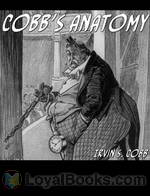 Cobb's Anatomy
Cobb's Anatomy
Irvin Shrewsbury Cobb was born on June 23, 1876. At seventeen years of age, he began writing for the Paducah Daily News, his hometown paper. At nineteen he became the managing editor; up to that point, our nation’s youngest. He worked as a columnist, a humorist and an author. But ‘horror,’ and ’short stories,’ are not why he is remembered. He is remembered because he was, and still is, funny. And although he is now dead–he died March 11, 1944–this work “Cobb’s Anatomy,” among others, has left an indelible mark upon mankind: a smile. | |
 One Third Off
One Third Off
Irvin Shrewsbury Cobb (June 23, 1876–March 11, 1944) was an American author, humorist, and columnist who lived in New York and wrote over 60 books and 300 short stories. Cobb has been described as “having a round shape, bushy eyebrows, full lips, and a triple chin. He always had a cigar in his mouth.” This book is a hilarious account of Cobb’s attempts at weight-loss. | |
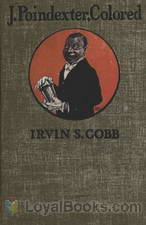 J. Poindexter, Colored
J. Poindexter, Colored
This comic novel relates the first-person adventures in New York City of Jefferson Poindexter, personal assistant to Cobb's famous Judge Priest, while the judge is vacationing abroad. (Introduction by Grant Hurlock) | |
By: Irving Bacheller (1859-1950) | |
|---|---|
 Prodigal Village; A Christmas Tale
Prodigal Village; A Christmas Tale
Small town life in early twentieth century New York state. This is a piquant parable of human nature. Bacheller's lightly humorous voice is evident throughout. Not all listeners will agree with the author's view of labor and management. - Summary by david wales | |
By: Irwin Leslie Gordon (1888-1954) | |
|---|---|
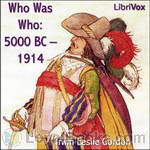 Who Was Who: 5000 BC – 1914
Who Was Who: 5000 BC – 1914
A short, humorous biography of famous people from 5000 BC to 1914. — S. McGaughey From the Introduction, “The editor begs leave to inform the public that only persons who can produce proper evidence of their demise will be admitted to Who Was Who. Press Agent notices or complimentary comments are absolutely excluded, and those offering to pay for the insertion of names will be prosecuted. As persons become eligible they will be included without solicitation, while the pages will be expurgated of others should good luck warrant.” | |
By: Irwin S. Cobb (1876-1944) | |
|---|---|
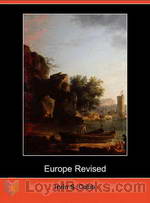 Europe Revised
Europe Revised
Irwin Cobb’s humorous Europe Revised is a travelogue and comedy almost in the style of Mark Twain. The dedication says it best, “To My Small DaughterWho bade me shed a tear at the tomb of Napoleon, which I was very glad to do, because when I got there my feet certainly were hurting me.” | |
By: Israel Zangwill (1864-1926) | |
|---|---|
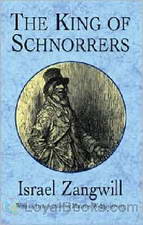 The King of Schnorrers
The King of Schnorrers
Manasseh da Costa is a schnorrer (beggar) who lives on the charitable contributions of the Jews of late 18th-century London. But Manasseh is far from being a humble panhandler for, as every schnorrer knows, supporting the poor is a commandment from God (a mitzvah) not just a favour. And as the descendant of Portuguese Jews who had lived in England for many generations, Manasseh is the social superior of those newly arrived from Eastern Europe (called ‘Tedesco’), even his wealthy patron Joseph Grobstock... | |